Literary Visual and Cultural Studies
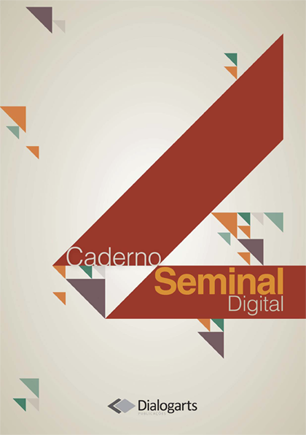
Modelos de Construção do Romance Africano em Nyembête ou As Cores da Lágrima
Abstract:
This study is based on Calane da Silva’s proposal, as an essayist, on the writing of the new African novel for the 21th century, which in my view still needs debate, but which can already be analyzed from the author’s own proposal, in his novel Nyembête ou as cores da lágrima. I demonstrate, with this research, the characteristics that allow us to accept the work as a formation novel, a designation that I borrow from Puga (2016). I argue that it is a narrative with neo-romantic elements, namely polyphony and death with the possibility of return, factually found in the Traditional Bantu Culture and in the Apostolic Catholic Tradition, and I also consider its perspective of a self-fictional novel (Faedrich, 2015), bearer of biographical marks of its author. In developing this research, I do so in the knowledge that it is a different conception of writing than what is usual to find in Calane da Silva – prose writer and short story writer (because he was also a poet). Added to this, in this article I observe that the author takes an approach to spirituality, centered on his studies on Spiritual Anthropology.
Quotation:
Laisse, S. J. (2023). “Modelos de Construção do Romance Africano em Nyembête ou as Cores da Lágrima”, In: A narrativa moçambicana no século XXI. Caderno Seminal Digital (n.º 45). Dialogarts. DOI http://dx.doi.org/10.12957/seminal.2023.79833

Subversão do Romance Policial e Questões de Memória em A Ilha dos Mulatos
Abstract:
This article presents a study about A Ilha dos Mulatos (2020), by Sérgio Raimundo, based on the structure of the detective novel, which is subverted and expanded to the level of narration, creating a game of masks in order to uncover the narrative voices. It deals with the theories of memory and the way memory is treated in the novel, unfolding in the notion of post-memory. Articulating memory as one of the necessary elements for the discovery of the guilty in the framework of the crime novel, we verify that it also turns out to be subverted in the writing of this novel.
Quotation:
Jeremias, R. & Leite, A. M. (2023). “Subversão do Romance Policial e Questões de Memória em A Ilha dos Mulatos”, In: A narrativa moçambicana no século XXI. Caderno Seminal Digital (n.º 45). Dialogarts. DOI http://dx.doi.org/10.12957/seminal.2023.79829
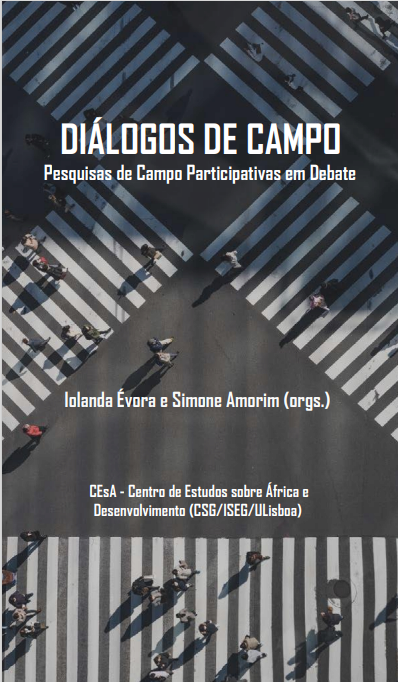
Diálogos de Campo – Pesquisas de Campo Participativas em Debate
Abstract:
This volume brings together concerns that serve as the basis for a continued debate on the mutual implications of research in the field of Social Sciences. The texts start from the common observation about the weakening of demands about “how we do it” in social research and deal with aspects related to fieldwork that are increasingly losing space in academia, essentially focused on producing results. From the fields of Social Sciences, Cinema, Literature, and Psychology, among others, the themes move between the dimensions of power hierarchies in research and the contexts that exponentiate them; the position and positionality of the researcher, and where we are placed by our interlocutors or people in the situations addressed. Specifically, they reflect on participatory methodologies and changes in knowledge production; ethnography and epistemic decolonization when the researcher does research in their life context; the interferences and determinations dictated by the field, during research; collaborative or participatory research, whether with refugee associations, in the field of artistic training or action research on bicycles and the city. Furthermore, the researcher’s subjectivity and writing regarding anti-racist cinema are addressed; as the implications of the researchers themselves in researching topics such as the impact of the pandemic on women, cultural heritage, or an object present, simultaneously, on different continents. The classic questions of the debate on methodology are present, which are, in fact, the foundations of current affairs, bringing different nuances of the contemporary debate, in social research, at a time when easier access to information reduces the distance and access of society (and the subjects of social research) to the knowledge about themselves produced in academia. This book was designed within the scope of the methodology workshops of the Afro-Port project (FCT/CEsA) and coincides with the project’s objective of contributing to a program in horizontal methodology and grounded methodology that is original, innovative and transdisciplinary, sustained by the interest in dialogue between academic and non-academic/scientific and non-scientific discourse.
Quotation:
Évora, I. e Amorim, S. (2023). “Diálogos de Campo – Pesquisas de Campo Participativas em Debate”. Lisboa, CEsA/CSG. ISBN 978-989-54687-4-4
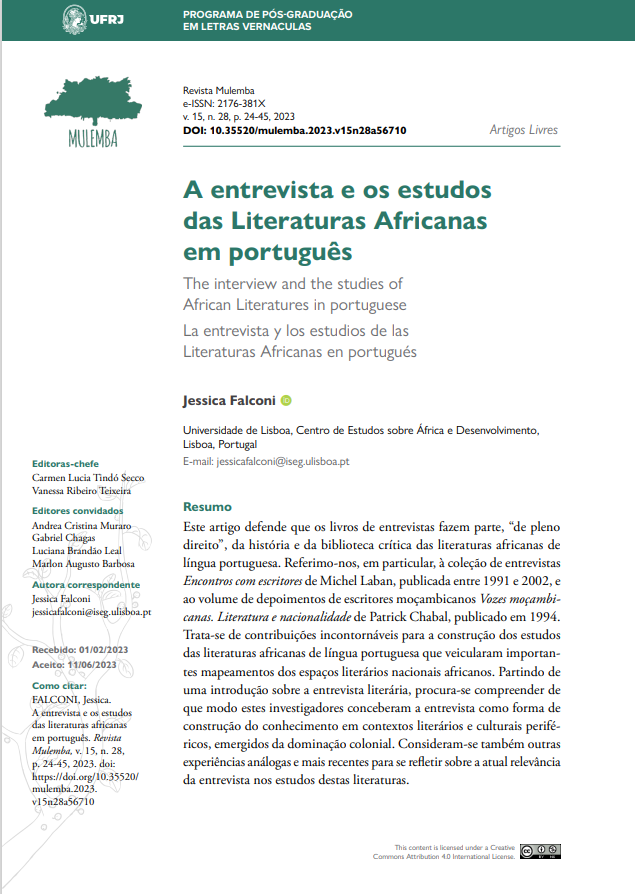
A Entrevista e os Estudos das Literaturas Africanas em Português
Abstract:
This article argues that interview books are a “full right” part of the history and critical library of Portuguese-language African literature. We refer, in particular, to the collection of interviews “Encontros com Escritores” by Michel Laban, published between 1991 and 2002, and the volume of testimonies by Mozambican writers “Vozes Mozambicanas. Literature and nationality by Patrick Chabal”, published in 1994. These are unavoidable contributions to the construction of studies of Portuguese-language African literatures that conveyed important mappings of African national literary spaces. Starting from an introduction to the literary interview, we seek to understand how these researchers conceived the interview as a way of building knowledge in peripheral literary and cultural contexts, emerging from colonial domination. Other similar and more recent experiences are also considered to reflect on the current relevance of interviews in studies of these literatures.
Quotation:
FALCONI, J. A entrevista e os estudos das literaturas africanas em português. Revista Mulemba, v. 15, n. 28, p. 24-45, 2023. doi: https://doi.org/10.35520/mulemba.2023.v15n28a56710
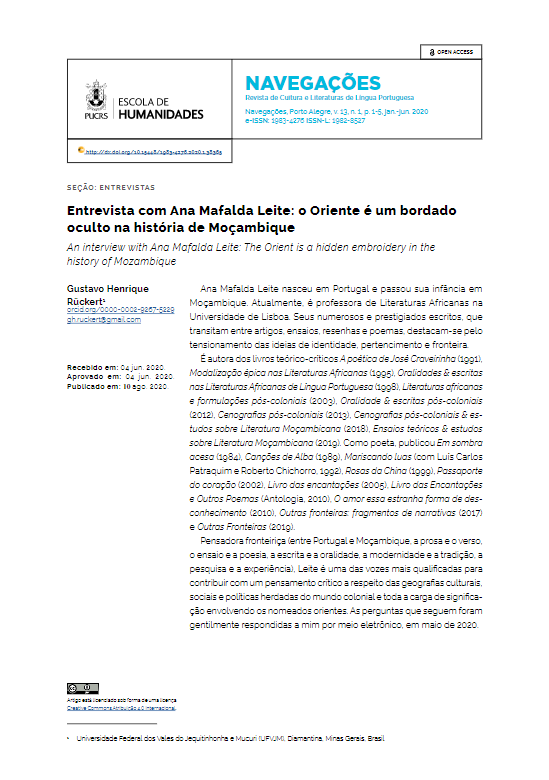
O Oriente é um bordado oculto na história de Moçambique: Entrevista com Ana Mafalda Leite
In this interview, Ana Mafalda Leite discusses the Indian Ocean and the East, as well as their meanings for Mozambican literature and for her poetic and academic trajectory.
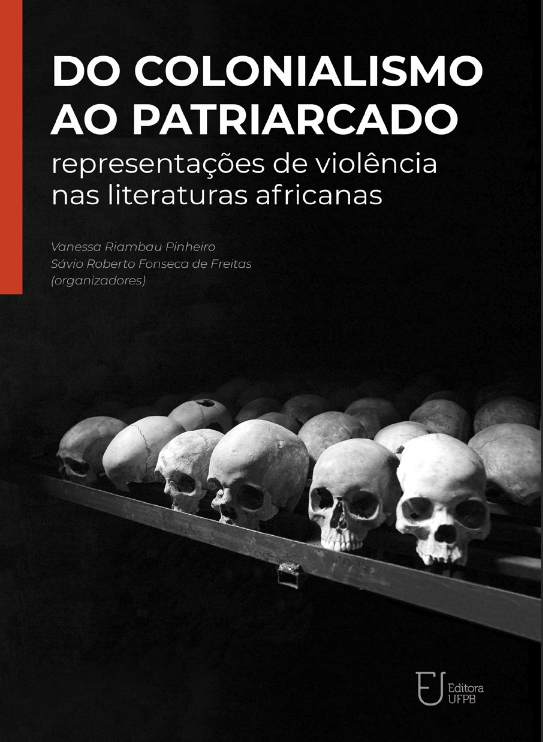
Violência e Morte na poesia de José Craveirinha
Resumo:
In this second article of the journal “Do Colonialismo ao Patriarcado: Representações da Violência nas Literaturas Africanas”, Violência e Morte na poesia de José Craveirinha, Ana Mafalda Leite (CEsA/CSG/ISEG/ULisboa) studies the representation of elements related to violence and death in José Craveirinha’s poetry. The last books by José Craveirinha, published during his life, Babalaze das Hienas (1992) and Maria (1998) deal with the theme of death, apparently from different points of view. In fact, the publication of unpublished books in the last phase of his life included, besides these two books, a first edition of Maria (1988). The previous books, Xigubo, Karingana ua Karingana and Cela 1, which have also been re-edited, are part of the poetic production made during the colonial period. Craveirinha, always writing, but shy of publication, bequeathed us Babalaze and Maria as the result of his writing in post-colonial times, although we know, however, that other material exists, still unpublished. The books in question have in common a similar formal trait, short poems, almost epigrammatic inscriptions, as a result of a daily proximity to the experience of death, on the one hand of the beloved woman, in the case of Maria, and on the other hand of death resulting from the civil war, in the case of Babalaze das Hienas.
Citação:
Leite, Ana Mafalda. “Violência e Morte na poesia de José Craveirinha”. In Do Colonialismo ao Patriarcado: Representações da Violência nas Literaturas Africanas, 33-42. 2020.
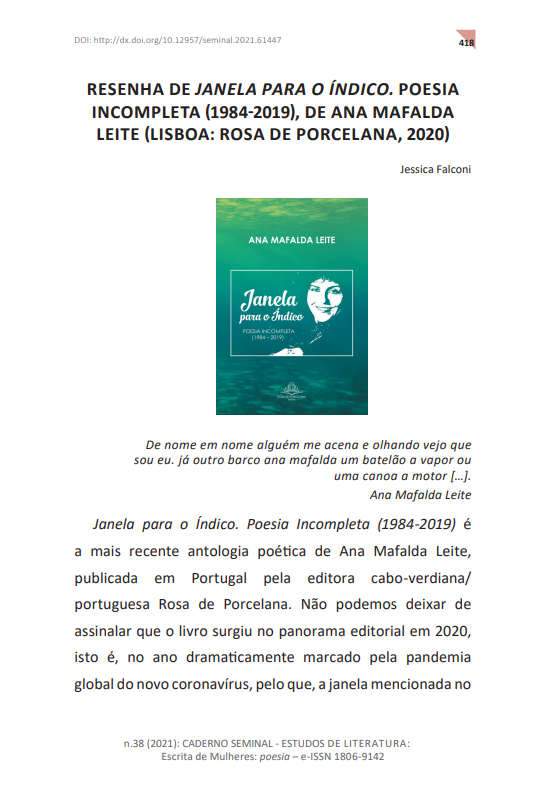
Resenha De Janela Para O Índico. Poesia Incompleta (1984-2019), De Ana Mafalda Leite
Abstract:
Resenha de Janela para o Índico. Poesia Incompleta (1984-2019) focuses on the most recent poetic anthology by Ana Mafalda Leite, published in Portugal by the Cape Verdean/Portuguese publishing house Rosa de Porcelana. We cannot fail to point out that the book appeared on the publishing scene in 2020, that is, in the year dramatically marked by the global pandemic of the new coronavirus, so the window mentioned in the title acquired an even more suggestive sense of freedom and openness. The anthology is organised into nine sections, which correspond to the books previously published by the author, from which a wide and careful selection was made, and a section with two unpublished texts. Thus, this Window witnesses a path of thirty-five years of poetic writing. A journey that is parallel to an equally long and consolidated career as a teacher and scholar of literature and cinema from the five Portuguese-speaking African countries. It is worth mentioning that Ana Mafalda Leite’s poetic writing has been the object of growing appreciation and recognition by the critics and the public. Her poetic texts have been included in various academic publications – in addition to anthologies and literary magazines – such as Itinerâncias and Vozes femininas de África, among others. In 2015 she was awarded the Femina1 prize for her poetic production, and in 2011 her poems were translated into English and published in the volume Stained Glass. Poetry from the Land of Mozambique, organized by Luís Rafael Mitras. It should also be noted that a selection of poems, from Janela para o Índico, will soon be published in Italian translation, on the initiative of Roberto Francavilla.
Quotation:
Falconi, J. (2021). Resenha De Janela Para O Índico. Poesia Incompleta (1984-2019), De Ana Mafalda Leite, Caderno Seminal 38.1, p. 418-443

Literatures and Cultures of the Indian Ocean
Abstract:
Portuguese Studies is a biannual multi-disciplinary journal dedicated to research on the cultures, literatures, history, and societies of the Lusophone world. Ana Mafalda Leite, Elena Brugioni, and Jessica Falconi were the organizers of this issue of the journal, Literatures and Cultures of the Indian Ocean. The president of the Editorial Board for 2021 is Catarina Fouto, and the Journals editor is Emanuelle Rodrigues Dos Santos. The journal is published by the Modern Humanities Research Association (MHRA), an international organization with members in all parts of the world. The aim of the Association is to encourage and promote advanced study and research in the field of modern humanities. It is concerned to break down barriers between scholars working in different disciplines and to maintain the unity of humanistic scholarship in the face of increasing specialization. The present volume results frorn the scholarly work conducted by members of the research project NILUS — Narratives Ofthe Indian Ocean in the Lusophone Space. The main purpose of the project consisted in establishing a theoretical and disciplinary connection between Lusophone Literary, Visual and Cultural Studies and the transdisciplinary field Of Indian Ocean Studies. The project on the written and visual narratives hailing from, or related to, the territories formerly colonized by Portugal along the Indian Ocean, specifically Mozambique, Goa, and East Timor. This volume, therefore, constitutes an attempt to bridge a significant critical and disciplinary gap, motivated by an almost total lack of dialogue among the above-mentioned fields of study. This lack of dialogue becomes ever more apparent if we bear in mind the increasingly central role played by historical, anthropological, literary, and cultural studies of the Atlantic Ocean in addressing colonial and postcolonial cultural and identity-related outputs and relations from the territories that Out Of Portuguese colonial rule. Consider, for instance, the influence of the notion of Brown Atlantic (Atlântico Pardo), de,’eloped by the anthropologist Miguel Vale de Almeida as a counterpoint to Paul Gilroy’s Black Atlantic, or the use of the Portugal -Brazil-Angola triangulation in comparative and transnational- oriented literary and cultural studies.4
Quotation:
Leite, A.M.; Brugioni, E. & Falconi, J. (2021) (eds). “Literatures and Cultures of the Indian Ocean”, Portuguese Studies 37.2.

Enchanted Things to Narrate the Oceans: João Paulo Borges Coelho and Luís Cardoso
Abstract:
Enchanted Things to Narrate the Oceans: João Paulo Borges Coelho and Luís Cardoso stems from the research developed under the NILUS project and, in particular, falls within the research strand that explored the role of material culture and materiality in contemporary narratives of the Lusophone Indian Ocean. The paper focuses on the short story ‘O Pano Encantado’ (2005) by João Paulo Borges Coelho and the novel Requiem para o Navegador Solitário (2007) by Luís Cardoso – two narratives set in island spaces, the small island of Mozambique and the island of Timor, respectively. It aims to validate the hypothesis that the appeal to material culture and materiality offers a way of narrating and remembering (in) the Indian Ocean from different shores of its range. The article was produced for the Modern Humanities Research Association (MHRA), an international organization with members in all parts of the world. The aim of the Association is to encourage and promote advanced study and research in the field of modern humanities. It is concerned to break down barriers between scholars working in different disciplines and to maintain the unity of humanistic scholarship in the face of increasing specialization.
Quotation:
Falconi, J. (2021). Enchanted Things to Narrate the Oceans: João Paulo Borges Coelho and Luís Cardoso. Portuguese Studies, 37(2), 224–241. https://doi.org/10.5699/portstudies.37.2.0224
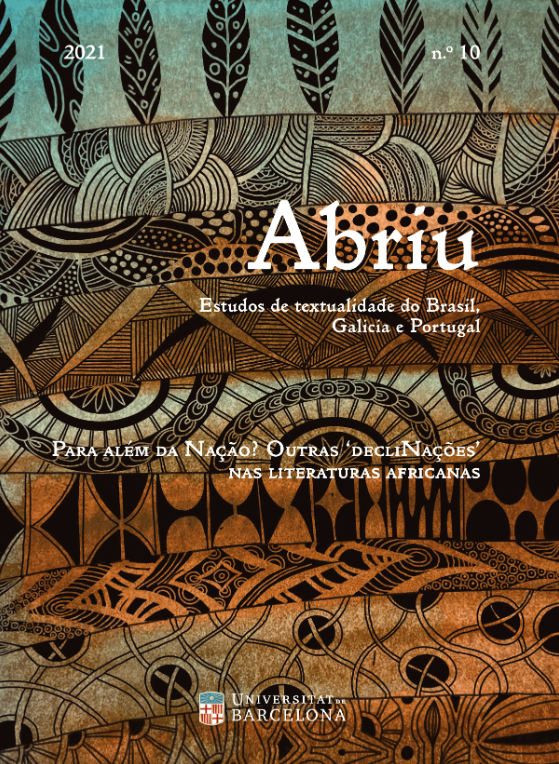
Beyond Nationhood: Other ‘Declensions’ in African Literatures
Abstract:
In the last two decades, Portuguese-speaking African literature, as a field of critical inquiry and object of academic study,1 has been undergoing a great expansion, with numerous dissertations, monographs, conference proceedings, special issues of journals, and articles produced in several countries. The article Beyond Nationhood: Other ‘Declensions’ in African Literatures traces the evolution of the national perspective in the studies of Lusophone African Literatures from the 1980s to the present. Based on a selection of collective and individual publications, as well as highlighting impor tant academic events for the area, the article seeks to identify lines of continuity and moments of rupture in the approach of these literatures based on the idea of Nation as a critical category and unity of analysis, from the consolidation of the link between literature and national independence affirmed after decolonization until the reception of post-colonial theories which occurred in the mid-1990s. Also, the article looks at the theoretical and disciplinary articulations between African Literature, Postcolonial Studies, Indian Ocean Studies and Comparative Litera tures, to provide a possible mapping of the most recent approaches that seek to build new critical cartographies for the studies of these literatures.
Quotation:
Falconi, J. (2021). Beyond Nationhood: Other ‘Declensions’ in African Literatures. Abriu: Estudos De Textualidade Do Brasil, Galicia E Portugal, (10), 9–38. https://doi.org/10.1344/abriu2021.10.1





